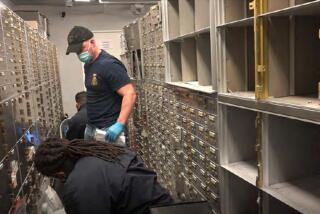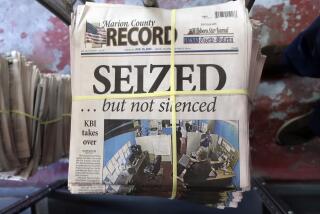The Trashing of Freedom
- Share via
The U.S. Supreme Court’s ruling that trash loses its Fourth Amendment protection once it’s placed at the curb may not be all that shocking, on its own. After all, what ends up in the trash can is what householders willingly abandon, usually without a backward glance, not property or personal effects that they hold dear. Why shouldn’t the police as well as the neighborhood pets be allowed to rip open the big Hefty bags and scavenge through the coffee grounds?
Our reservation about the decision is that it carves out still another exception to the general Fourth Amendment requirement that the police persuade a judicial officer that there is “probable cause” to believe that a search will turn up evidence of crime and obtain a warrant before undertaking the search. Warrants were fundamental to the drafters of the Bill of Rights, perhaps because so many American colonists had hated the sweeping searches conducted by officers of the British Crown, armed only with very general “writs of assistance.” The first draft of the Fourth Amendment, in fact, so focused on warrants that it could have been read to ban all warrantless searches.
That was nearly two centuries ago, of course. In recent years the Supreme Court has allowed all kinds of exceptions to the warrant requirement.
Police still need a warrant to search a person’s house but not to search the open fields around a house, even when “No Trespassing” signs are posted, or a fenced back yard visible to low-flying aircraft. A warrant is still required to tap a telephone but not to obtain from the telephone company the numbers that a criminal suspect has dialed. Since 1925 the Supreme Court has upheld warrantless searches of automobiles suspected of carrying contraband, on the reasonable ground that they might disappear while a warrant was being requested; more recently that same rationale has been applied to allow the police, without warrants, to search luggage, lunch bags and other packages inside automobiles. Without a warrant the police can take a blood sample from a suspect, though pumping his stomach is forbidden. Juveniles have even fewer Fourth Amendment rights than adults; the courts have allowed school administrators, without warrants or even probable cause, to rummage through students’ purses and personal belongings.
Why are search warrants so vital? As the late Justice Robert H. Jackson once explained, the Fourth Amendment stands for the proposition that it should be up to “a neutral and detached magistrate,” not a police “officer engaged in the often competitive enterprise of ferreting out crime,” to decide “when the right of privacy must reasonably yield to . . . (a) search.” Any search “is . . . of grave concern, not only to the individual but to a society which chooses to dwell in reasonable security and freedom from surveillance,” Jackson wrote.
As the exceptions to the search-warrant requirement proliferate, all but swallowing the rule, the danger is that there will be less incentive for the police to seek warrants. What this means is that officers will decide for themselves when to intrude on personal privacy and launch a search, instead of asking the “neutral and detached magistrates” whom Justice Jackson--and the Founding Fathers--had in mind.
More to Read
Sign up for Essential California
The most important California stories and recommendations in your inbox every morning.
You may occasionally receive promotional content from the Los Angeles Times.










